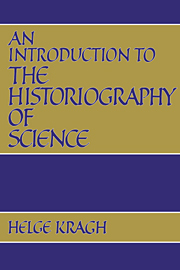Book contents
- Frontmatter
- Contents
- Preface
- 1 Aspects of the development of the history of science
- 2 History of science
- 3 Objectives and justification
- 4 Elements of theory of history
- 5 Objectivity in history
- 6 Explanations
- 7 Hypothetical history
- 8 Structure and organization
- 9 Anachronical and diachronical history of science
- 10 Ideology and myths in the history of science
- 11 Sources
- 12 Evaluation of source materials
- 13 Scientists' histories
- 14 Experimental history of science
- 15 The biographical approach
- 16 Prosopography
- 17 Scientometric historiography
- Notes
- Bibliography
- Index
10 - Ideology and myths in the history of science
Published online by Cambridge University Press: 30 November 2009
- Frontmatter
- Contents
- Preface
- 1 Aspects of the development of the history of science
- 2 History of science
- 3 Objectives and justification
- 4 Elements of theory of history
- 5 Objectivity in history
- 6 Explanations
- 7 Hypothetical history
- 8 Structure and organization
- 9 Anachronical and diachronical history of science
- 10 Ideology and myths in the history of science
- 11 Sources
- 12 Evaluation of source materials
- 13 Scientists' histories
- 14 Experimental history of science
- 15 The biographical approach
- 16 Prosopography
- 17 Scientometric historiography
- Notes
- Bibliography
- Index
Summary
Histories of science involve particular perspectives, aims and methods of organizing materials that do not arise out of the objectively given past itself. Very often, history of science also serves a legitimating function. The fact that histories are written with commitment and from a particular motive, or may serve legitimating functions, does not necessarily imply that they are products of bad historiography (see also chapter 5). But as soon as documentary evidence is distorted, ignored or allocated disproportionate importance in order to fit in better with a particular moral that serves a social function, history becomes ideological.
I shall use the term ‘ideology’ in the sense that an ideological doctrine is a doctrine which legitimates the views and interests of a particular social group. This is a necessary but not a sufficient condition. The doctrine must also give a distorted or misrepresented picture of the reality it refers to. According to Althusser, an ideology is ‘a statement which, while it is a symptom of a reality that is separate from the reality it refers to, is a false statement in so far as it touches on the object it has in view’. The bias that is connected with ideological doctrines can be deliberate; but it will not normally be so. Ideologies are rarely admitted by the ideologists, nor by the social group to whose interests the ideology is directed.
Ideological historical writing covers a wide spectrum. At the one extreme there are outright ideological histories which serve, for example, political purposes. These ‘external’ ideologies are directed to the lay public or political bodies, serving a wider political function.
- Type
- Chapter
- Information
- An Introduction to the Historiography of Science , pp. 108 - 119Publisher: Cambridge University PressPrint publication year: 1987

